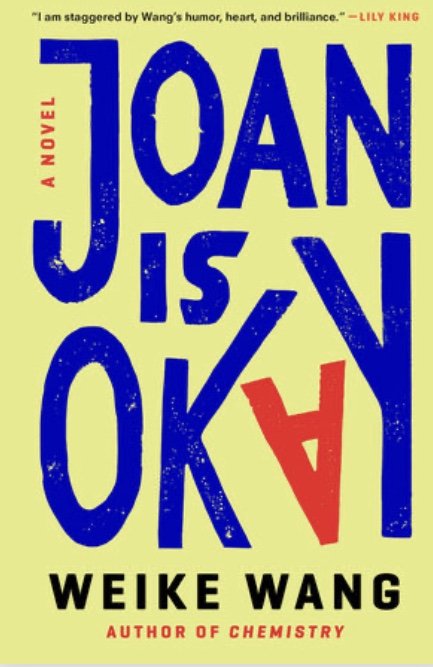Joan Is Okay by Weike Wang (Random House)
Joan is the kind of woman who makes dinner table conversation by complimenting her host’s utensils. At 36, she has never had a boyfriend. She has no hobbies. She has no idea who or what Seinfeld is because she doesn’t own a television. Her apartment is so spartan that when her next door neighbor sees it, he asks if she had recently been robbed.
Under five feet tall and weighing less than one hundred pounds, Joan is easy to overlook, unless she’s at work. In the ICU of a busy Manhattan hospital, she’s the attending physician, the one who teaches and supervises the other doctors, ““the most senior person in the room.” She’s “a gunner, and a new breed of doctor, brilliant and potent, with no interests outside work and sleep,” the hospital director says approvingly.
Neither he nor anyone around her thinks this is peculiar behavior until the day Joan asks other doctors to cover her weekend shift. Her father has had a fatal stroke in Shanghai and she needs to attend his funeral. When she returns to the hospital 48 hours later, with 32 of those hours spent in the air, both the director and the human resources department are forced to realize that this may be an excessive work commitment that “the gunner” displays. She’s told to take time off, “to reassess, recenter, release.” “It’s only six weeks,” the director assures her, “time will fly.” “I couldn’t quite picture that,” Joan decides, “unless I was put in a coma.”
“I love my brother,” she tells the director when he asks about her family, “we met in Wichita.” Like many of Joan’s statements, this is eerily true. She didn’t know she had a brother until she was four and a twelve-year-old boy showed up, her parents’ first child whom they’d left in Shanghai with relatives six years before. That elusive quality characterizes her familial relationships. The minute Joan turns eighteen and enters Harvard, her parents move back to Shanghai, “their jobs as parents complete.” `Her final visit with her father is a quick chat in the hospital cafeteria that ends before she’s finished her cup of coffee and soon after his funeral, her mother announces her unexpected US arrival in a phone call that she begins with “This is your mother. I’m having terrible jet lag.” Her brother, rich and successful, owns a ten-acre compound in Connecticut where the grass is cut “more often than I cut my nails,” Joan observes. Their visits are filled with his nagging that she leave the hospital and take up a more lucrative private practice. “I lost my brother,” she says, “the day he decided to become my parent.”
This should by rights be a grim novel about a woman who is clearly somewhere on the spectrum, with social skills that hover around absolute zero. Instead it’s hilarious. Although Joan’s mother is scathingly accurate when she tells her daughter, “You’re a very literal person,” Joan is a woman who refuses to tolerate pretensions and who regards the world without filters. She’s smart and funny and completely devoid of self-pity. “A person of two languages and two cultures,” Joan gives a unique perspective on “the gulfs within families…the migrations we have to make…the cost of love” without pomposity or finger-pointing. She --and this book--radiate pure delight and both are absolutely, stunningly, more than okay.~Janet Brown
